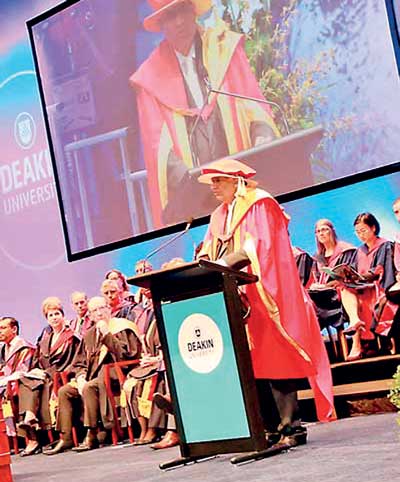Reply To:
Name - Reply Comment
Last Updated : 2024-04-24 17:01:00

Based on industry surveys at least a minimum 400,000 jobs are available in the hotel, tourism and industrial sectors per annum in the next three years. According to a survey conducted by Prof. Athula Ranasinghe, Dean of the Faculty of Arts, University of Colombo, there were unfilled vacancies in the apparel sector - 58 percent, 20 percent in food and 33 percent in other manufacturing sectors. Therefore, the real issue is not about jobs but good jobs and finding skilled and semi-skilled people to fill those jobs.
The recently concluded Human Capital Summit organised by the government, the private sector and development partners identified five broad issues that need to be addressed. The first challenge was to attract more women employees into the workforce. To achieve this target, there is a need to provide an accommodating ecosystem to attract and retain women in the workplace. The current participation is only 38 percent from the estimated 8.5 million. Almost 2.8 million of the labour force constitutes economically inactive women. This is in spite of the fact that educated and qualified women outnumber men. Secondly, urgent labour law reforms are needed to drive employment creation, greater productivity, innovation, human resource development (HRD) and foreign direct investment (FDI). Thirdly, Sri Lanka lacks adequate vocational and technical skills in the labour force. A high proportion of firms in Sri Lanka identify a shortage of vocational and technical skills as a major constraint compared to other middle-income and developing countries. The drive for industrial growth is especially hindered by the shortage of technically skilled labour. Therefore, technical vocational education and training (TVET) must be made relevant in consultation with the private sector. 
Fourth is improving access to higher education. We spend less than 0.4 percent of our gross domestic product (GDP) on higher education. We need to drive innovation in higher education, particularly online and by using modern technology including robots that will make training cost effective and in a more flexible, personalized, than the present manner in which the traditional degrees or postgraduate courses are delivered.
Lastly, building the talent supply for industry, generally young Lankans shun taking skilled and non-skilled jobs with a monthly pay of around Rs.25,000-40,000 in factories and hotels but they tend to prefer to work as trishaw drivers instead; currently we have around 1.2 million trishaw drivers. Many institutions are struggling to fill vacancies. The government needs to work with the industry to address this serious issue. For example, in Malaysia, rubber tappers were given gainful employment in the electronic industry after completion of their training. Therefore, they should be given training on other vocations such as modern technology jobs so that they would be able to work in different fields. Also the working-age people with disabilities in Sri Lanka, less than half are employed – this figure should be much higher. With the right support, many more could join their ranks.
Million jobs
Therefore, the one million jobs that the government hopes to create could come from the tourism, construction, services and ICT sectors. Therefore, we need to enhance access to ICT degrees by linking with non-state higher education providers through the Sri Lanka Association of Software and Service Companies (SLASSCOM) under the direction of Information Communication and Technology Agency of Sri Lanka (ICTA) and creating access for both local and foreign fee-leaving students and providing a loan system.
The country projection for new jobs in ICT in 5 years is 150,000. The present maximum is 18,500 (state and non-state). The tourism sector would also create around 350,000 direct and indirect new jobs by 2020 and the yearly intake is only around 14,000 (state and non-state). The only way these issues can be addressed is through a formal forum that the prime minister is promoting, comprising of the private sector, government and trade union (TU) representatives and academia to set a vision and manage the implementation and also to focus on the educational outcomes and skills attainment.
Need to act fast
Sri Lanka’s construction, manufacturing, tourism and service sectors would find it extremely difficult to grow speedily in the coming years because of a shortage of semi and skilled labour. We all know this. Committee after committee is studying this. The outcomes so far have not delivered the required outcomes. Another key reason for this problem is because there is a huge shortage of both skilled and unskilled labour due to the unwillingness of people to join the industry and on the other hand, people seeking greener pastures.
We are steadily becoming a country that is not able to cater to the demand for workers in mid-professional, skilled and semi-skilled job categories. Companies that are facing problems to continue their work have already gained permission to employ Indian and Chinese workers in small numbers. One option would be to move the industry to the areas where the required labour resides but this needs careful planning.
Our labour shortage problem is largely due to the absence of poor manpower planning over the years; too many agencies and commissions involved in formulating national skills development policies, lack of career guidance, inadequate number of effective training facilities and lack of on-the-job training programmes for most school leavers. Therefore, career guidance should be provided for youth at school level immediately.
Foreign labour to fill gaps
Today, our youth in the country are clearly distancing themselves from agriculture and construction fields. Therefore, if international firms need foreign workers to fill the gaps and complete projects on time in accordance with their agreements with the government, we need to open up. Sri Lanka would definitely need to attract foreign talent and be open to welcoming workers from overseas to plug immediate as well as emerging talent gaps.
Manpower shortages in the construction sector is driven not only by low wages on offer but rather by shifting aspirations and work ethic that is not conductive to occupations seen as hard labour. To change this attitude among our youth will be very difficult. Therefore, importing labour for specific projects, periods and skill gaps would help to fill critical short-term skill gaps but a clear strategy is essential for growing our ‘own’ talent pool.
The future
While our labour market gaps are largely attributed to skill mismatches and poor planning, we need to now look beyond the labour and skill agenda and move towards a new agenda for business growth, job creation and improving our competitiveness. A solution to labour shortages must be to build a globally competitive higher- end businesses that can pay good wages and a good employment value proposition. Sri Lanka however desperately needs to introduce modern regulatory policies, engaged leaders and good soft infrastructure in order to become attractive for next generation businesses and investors.
(Dinesh Weerakkody is an HR thought leader)

Add comment
Comments will be edited (grammar, spelling and slang) and authorized at the discretion of Daily Mirror online. The website also has the right not to publish selected comments.
Reply To:
Name - Reply Comment
US authorities are currently reviewing the manifest of every cargo aboard MV
On March 26, a couple arriving from Thailand was arrested with 88 live animal
According to villagers from Naula-Moragolla out of 105 families 80 can afford
Is the situation in Sri Lanka so grim that locals harbour hope that they coul